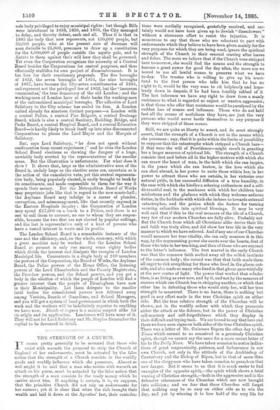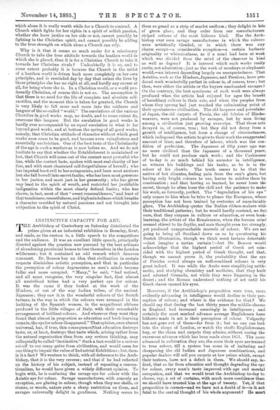THE STRENGTH OF A CELL RCH.
IT seems pretty generally to be assumed that those who resist with warmth the proposal to strip the Church of England of her endowments, must be actuated by the false notion that the strength of a Church consists in the worldly goods and worldly influence which she possesses. Almost as well might it be said that a man who resists with warmth an attack on his purse, must be actuated by the false notion that the strength of a man consists in the ready money which he carries about him. If anything is certain, it is, we suppose, that the primitive Church did not rely on endowments for her success ; yet it is clear that when the rich brought their wealth and laid it down at the Apostles' feet, their contribu-
tions were cordially recognised, gratefully received, and cer- tainly would not have been given up to Jewish " disenclowers " without a strenuous effort to resist the injustice. It is monstrous to say that those who are reluctant to part with endowments which they believe to have been given mainly for the very purposes for which they are being used, ignore the spiritual strength of the Church in their sensual craving after loaves and fishes. The more we believe that if the Church were stripped bare to-morrow, she would find the means and the strength to become a great power for good the day after, the more are we bound to use all lawful means to preserve what we have to-day. The trustee who is willing to give up his trust- fund to the first person who tells him that he has no right to it, would be the very man to sit helplessly and hope- lessly down in despair, if he had been forcibly robbed of it The last inference we have any right to draw from a manly resistance to what is regarded as unjust or wanton aggression, is that those who offer that resistance would be paralysed by the sudden loss of means and influence. Those who do not hold fast all the means of usefulness they have, are just the very persons who would never bestir themselves to any purpose if they were stripped of those means.
Still, we are quite at liberty to assert, and do most strongly assert, that the strength of a Church is not in the means which she possesses ; nay, that it is quite within the limits of possibility to suppose that the catastrophe which stripped a Church bare— if that were the will of Providence—might result in granting her a larger measure of spiritual life. The strength of a Church consists first and before all in the higher motives with which she can renew the heart of man, in the faith which she can inspire, in the peace which she can bestow, in the love which she can shed abroad, in her power to unite those within her, in her power to attract those who are outside, in her victories over natural pride, in her successful diffusion of a true humility, in the ease with which she kindles a sobering enthusiasm and a self- distrustful zeal, in the meekness with which her children bear misfortune and the gladness with which they welcome arduous duties, in the fortitude with which she imbues us towards external catastrophes, and the genius which she fosters for turning seeming calamities into spiritual blessings. It may be very well said that if this be the real measure of the life of a Church, very few of our modern Churches are fully alive. Probably not But the Church from which all Christians alike derive their life and faith was truly alive, and did show her true life in the very manner to which we have referred. And if any one of our Churches would measure her true vitality, she can only measure it in this way, by the regenerating power she exerts over the hearts, first of those who take in her teaching, and then of those who are exposed to the latter's influence. The first marvel in the early Church was that the common faith melted away all the selfish instincts of the common body ; the second was that that faith made them all eager to risk everything for those who lived in the gloom out- side, and also made so many who lived in that gloom gaze wistfully at the new centre of light. The power that worked that wOnder then, is as living as ever now, and by it, and not by the measure of success which one Church has in stripping another, or which that other has in defeating those who would strip her, will her true strength be measured. There is no harm, there is nothing but good in any effort made in the true Christian spirit on either side. But the true relative strength of the Churches will be shown, not in the worldly ardour with which they prosecute either the attack or the defence, bat in the power of Christian self-mastery and self-forgetfulness which they display in their difficult and trying task. We are bound to say that here and there we have seen signs on both sides of the true Christian spirit. There was a letter of Mr. Guinness Rogers the other day to the Times which seemed to us conceived in a genuinely Christian spirit, though we cannot say the same for a more recent letter of his to the Daily News. We have taken occasion to notice indica- tions of great magnanimity, patience, and forbearance in our own Church, not only in the attitude of the Archbishop of Canterbury and the Bishop of Ripon, but in that of more than one of the clergymen who have taken occasion to preach on that new danger. But it seems to us that it is much easier to find examples of the opposite spirit,—the spirit which shows a fatal waning of Christian strength,—both in the aggressive and in the defensive utterances of the Churches which are now brought into collision ; and we fear that these Churches will forget that nothing may be so easy on either side as to win the day, and, yet by winning it to lose hold of the very life for which alone it is really worth while for a Church to contend. A Church which fights for her rights in a spirit of selfish passion, whether she have justice on her side or not, cannot possibly be fighting in the Christian spirit, and cannot possibly be adding to the tree strength on which alone a Church can rely.
Why is it that it seems so much easier for a missionary Church to take the true attitude towards the heathen world in which she is placed, than it is for a Christian Church to take it towards her Christian rivals ? Undoubtedly it is so, and to some extent probably it is because the Church in the midst of a heathen world is driven back more completely on her own principles, and is reminded day by day that unless she lives by those principles she has no right at all, and hardly any excuse at all, for being where she is. In a Christian world, or a world pro- fessedly Christian, of course this is not so. The assumption is that there is no need for the life of complete and absolute self- sacrifice, and the moment this is taken for granted, the Church is very likely to fall more and more into the coldness and languor of the so-called "world." The emulations of the various Churches in good works may, no doubt, and to some extent do, overcome this languor. But the emulation in good works is hardly ever accompanied by an equal emulation in what is far beyond good works, and at bottom the spring of all good works, namely, that Christian attitude of character without which good works soon cease to be good, and become even vainglorious and essentially unchristian. One of the.best tests of the Christianity of the age is such a warfare as is now before us. And we do not hesitate to say that whether the Establishment is maintained or lost, that Church will come out of the contest most powerful who has, while the contest lasts, spoken with most real charity of her foes, and with most chastened self-forgetfulness of herself ; who has imputed least evil to her antagonists, and been most anxious lest she fall herself into secret faults; who has been most generous in her justice, and most just in her generosity ; who has given way least to the spirit of wrath, and restricted her justifiable indignation within the most clearly defined limits ; who has shown, in fact, most of that " sweet reasonableness," and least of that touchiness, resentfulness, and highinindedness which breathe a character moulded by natural passions and not brought into subjection to the spirit of Christ.







































 Previous page
Previous page